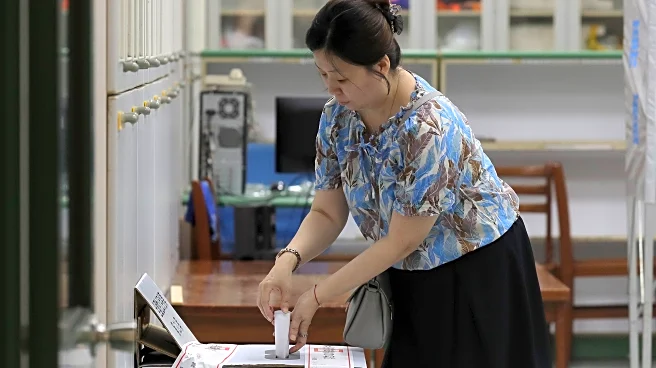TAIPEI, Taiwan (AP) — Opposition lawmakers easily survived recall votes in Taiwan on Saturday, but an opposition-backed referendum to bring back nuclear power failed.
The recall votes, the second in a month,
were an attempt to restore ruling party control of the legislature after the Democratic Progressive Party lost its majority in a 2024 election.
The recall results were a second straight setback for the ruling DPP. The seven lawmakers from the opposition Nationalist Party all held onto their seats, as did 24 members of other parties in a first round of recall votes on July 26.
The Democratic Progressive Party won the presidency in 2024 but neither main party took a majority in the 113-seat legislature. The Nationalists, also known as the Kuomintang or KMT, won 52 seats, one more than the DPP.
The Nationalists have teamed up with a third party, the Taiwan People’s Party, to pass legislation, much to the consternation of the ruling DPP.
Voters favored a return to nuclear power by an almost three-to-one margin, but the total in favor fell short of a threshold of 25% of eligible voters, or about 5 million votes, needed for approval.
The referendum was supported by 4.3 million voters and opposed by 1.5 million.
Taiwan shut down its last reactor in May under a DPP policy of phasing out nuclear power, which once provided about 20% of the self-governing island's electricity.
But the same month, the legislature approved a proposal from the Taiwan People’s Party to hold a referendum on extending nuclear power, with the support of the Nationalists.
The referendum asked voters if the most recently shut nuclear plant should continue operating, assuming regulators agreed it was safe to do so.
The last reactor at the Maanshan plant, one of three that Taiwan once operated, was shut three months ago after its 40-year operating license ran out.
Backers of nuclear power said it reduces electricity bills and helps meet the growing demand for power from artificial intelligence applications.
Jensen Huang, the Taiwan-born founder of American chip giant Nvidia, backed nuclear power when asked about the issue after arriving at the airport Friday in the capital, Taipei.
Citing AI's need for energy, he told reporters he hopes that all options will be explored. “There’s excellent technologies for sustainable energy — solar and wind,” he said. "And nuclear is an excellent option.”
In May, Nvidia announced it would team up with Taiwanese electronics manufacturer Foxconn to build an AI supercomputer for the island's researchers and companies.









